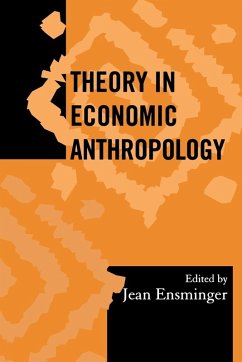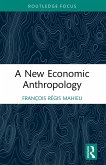Theory in Economic Anthropology
Herausgeber: Ensminger, Jean
Theory in Economic Anthropology
Herausgeber: Ensminger, Jean
- Broschiertes Buch
- Merkliste
- Auf die Merkliste
- Bewerten Bewerten
- Teilen
- Produkt teilen
- Produkterinnerung
- Produkterinnerung
This new volume from the Society for Economic Anthropology examines the unique contributions of anthropologists to general economic theory. The authors challenge our understanding of human economies in the expanding global systems of interaction, with models and analyses from cross-cultural research. The book will be a valuable resource for anthropologists, economists, economic historians, political economists, and economic development specialists.
Andere Kunden interessierten sich auch für
![Rise of Anthropological Theory Rise of Anthropological Theory]() Marvin HarrisRise of Anthropological Theory113,99 €
Marvin HarrisRise of Anthropological Theory113,99 €![Gender at Work in Economic Life Gender at Work in Economic Life]() Gender at Work in Economic Life56,99 €
Gender at Work in Economic Life56,99 €![A New Economic Anthropology A New Economic Anthropology]() François Régis MahieuA New Economic Anthropology18,99 €
François Régis MahieuA New Economic Anthropology18,99 €![Partial Connections Partial Connections]() Marilyn StrathernPartial Connections51,99 €
Marilyn StrathernPartial Connections51,99 €![Historical Transformations Historical Transformations]() Kajsa Ekholm FriedmanHistorical Transformations64,99 €
Kajsa Ekholm FriedmanHistorical Transformations64,99 €![Partial Connections Partial Connections]() Marilyn StrathernPartial Connections125,99 €
Marilyn StrathernPartial Connections125,99 €![Values and Valuables Values and Valuables]() Values and Valuables51,99 €
Values and Valuables51,99 €-
-
-
This new volume from the Society for Economic Anthropology examines the unique contributions of anthropologists to general economic theory. The authors challenge our understanding of human economies in the expanding global systems of interaction, with models and analyses from cross-cultural research. The book will be a valuable resource for anthropologists, economists, economic historians, political economists, and economic development specialists.
Produktdetails
- Produktdetails
- Verlag: Altamira Press
- Seitenzahl: 338
- Erscheinungstermin: 18. Dezember 2001
- Englisch
- Abmessung: 229mm x 152mm x 18mm
- Gewicht: 491g
- ISBN-13: 9780759102064
- ISBN-10: 0759102066
- Artikelnr.: 29023589
- Herstellerkennzeichnung
- Libri GmbH
- Europaallee 1
- 36244 Bad Hersfeld
- gpsr@libri.de
- Verlag: Altamira Press
- Seitenzahl: 338
- Erscheinungstermin: 18. Dezember 2001
- Englisch
- Abmessung: 229mm x 152mm x 18mm
- Gewicht: 491g
- ISBN-13: 9780759102064
- ISBN-10: 0759102066
- Artikelnr.: 29023589
- Herstellerkennzeichnung
- Libri GmbH
- Europaallee 1
- 36244 Bad Hersfeld
- gpsr@libri.de
Jean Ensminger is Professor of Anthropology at the California Institute of Technology, who carries out research in the new institutional economics, rational choice theory, experimental economics, and economic development.
Chapter 1 Introduction: Theory in Economic Anthropology at the Turn of the
Century
Part 2 Part I: The New Institutionalism
Chapter 3 Chapter 1: Property Rights and Incentives for Agricultural
Growth: Women Farmer's Crop Control and their Use of Agricultural Inputs
Chapter 4 Chapter 2: Transaction Cost Economics: Accomplishments, Problems
and Possibilities
Chapter 5 Chapter 3: Experimental Economics: A Powerful New Method for
Theory Testing in Anthropology
Part 6 Part II: Rethinking Wealth, Exchange, and the Evolution of Social
Institutions
Chapter 7 Chapter 4: Commodity Flows and the Evolution of Complex Societies
Chapter 8 Chapter 5: Economic Transfers and Exchanges: Concepts for
Describing Allocations
Chapter 9 Chapter 6: Polanyi and the Definition of Capitalism
Part 10 Part III: Small Producers Interacting with the Wider World
Chapter 10 Chapter 7: Chayanov and Theory in Economic Anthropology
Chapter 11 Chapter 8: Space, Place, and Economic Anthropology: Locating
Potters in a Sri Lankan Landscape
Chapter 12 Chapter 9: Indians, Markets, and Transnational Studies in
Mesoamerican Anthropology: Predicaments and Opportunities
Chapter 14 Part IV: Commodity Chains and the Formal/Informal Sector
Distinction
Chapter 15 Chapter 10: Transcending the Formal/Informal Distinction:
Commercial Relations in Africa and Russia in the Post-1989 World
Chapter 16 Chapter 11: Commodity Chains and the International Secondhand
Clothing Trade: Salaula and the Work of Consumption in Zambia
Part 18 Part V: The Role for Big Theory in Economic Anthropology
Chapter 19 Chapter 12: When Good Theories Go Bad: Theory in Economic
Anthropology and Consumer Research
Chapter 19 Chapter 13: Decision-Making, Cultural Transmission and
Adaptation in Economic Anthropology
Century
Part 2 Part I: The New Institutionalism
Chapter 3 Chapter 1: Property Rights and Incentives for Agricultural
Growth: Women Farmer's Crop Control and their Use of Agricultural Inputs
Chapter 4 Chapter 2: Transaction Cost Economics: Accomplishments, Problems
and Possibilities
Chapter 5 Chapter 3: Experimental Economics: A Powerful New Method for
Theory Testing in Anthropology
Part 6 Part II: Rethinking Wealth, Exchange, and the Evolution of Social
Institutions
Chapter 7 Chapter 4: Commodity Flows and the Evolution of Complex Societies
Chapter 8 Chapter 5: Economic Transfers and Exchanges: Concepts for
Describing Allocations
Chapter 9 Chapter 6: Polanyi and the Definition of Capitalism
Part 10 Part III: Small Producers Interacting with the Wider World
Chapter 10 Chapter 7: Chayanov and Theory in Economic Anthropology
Chapter 11 Chapter 8: Space, Place, and Economic Anthropology: Locating
Potters in a Sri Lankan Landscape
Chapter 12 Chapter 9: Indians, Markets, and Transnational Studies in
Mesoamerican Anthropology: Predicaments and Opportunities
Chapter 14 Part IV: Commodity Chains and the Formal/Informal Sector
Distinction
Chapter 15 Chapter 10: Transcending the Formal/Informal Distinction:
Commercial Relations in Africa and Russia in the Post-1989 World
Chapter 16 Chapter 11: Commodity Chains and the International Secondhand
Clothing Trade: Salaula and the Work of Consumption in Zambia
Part 18 Part V: The Role for Big Theory in Economic Anthropology
Chapter 19 Chapter 12: When Good Theories Go Bad: Theory in Economic
Anthropology and Consumer Research
Chapter 19 Chapter 13: Decision-Making, Cultural Transmission and
Adaptation in Economic Anthropology
Chapter 1 Introduction: Theory in Economic Anthropology at the Turn of the
Century
Part 2 Part I: The New Institutionalism
Chapter 3 Chapter 1: Property Rights and Incentives for Agricultural
Growth: Women Farmer's Crop Control and their Use of Agricultural Inputs
Chapter 4 Chapter 2: Transaction Cost Economics: Accomplishments, Problems
and Possibilities
Chapter 5 Chapter 3: Experimental Economics: A Powerful New Method for
Theory Testing in Anthropology
Part 6 Part II: Rethinking Wealth, Exchange, and the Evolution of Social
Institutions
Chapter 7 Chapter 4: Commodity Flows and the Evolution of Complex Societies
Chapter 8 Chapter 5: Economic Transfers and Exchanges: Concepts for
Describing Allocations
Chapter 9 Chapter 6: Polanyi and the Definition of Capitalism
Part 10 Part III: Small Producers Interacting with the Wider World
Chapter 10 Chapter 7: Chayanov and Theory in Economic Anthropology
Chapter 11 Chapter 8: Space, Place, and Economic Anthropology: Locating
Potters in a Sri Lankan Landscape
Chapter 12 Chapter 9: Indians, Markets, and Transnational Studies in
Mesoamerican Anthropology: Predicaments and Opportunities
Chapter 14 Part IV: Commodity Chains and the Formal/Informal Sector
Distinction
Chapter 15 Chapter 10: Transcending the Formal/Informal Distinction:
Commercial Relations in Africa and Russia in the Post-1989 World
Chapter 16 Chapter 11: Commodity Chains and the International Secondhand
Clothing Trade: Salaula and the Work of Consumption in Zambia
Part 18 Part V: The Role for Big Theory in Economic Anthropology
Chapter 19 Chapter 12: When Good Theories Go Bad: Theory in Economic
Anthropology and Consumer Research
Chapter 19 Chapter 13: Decision-Making, Cultural Transmission and
Adaptation in Economic Anthropology
Century
Part 2 Part I: The New Institutionalism
Chapter 3 Chapter 1: Property Rights and Incentives for Agricultural
Growth: Women Farmer's Crop Control and their Use of Agricultural Inputs
Chapter 4 Chapter 2: Transaction Cost Economics: Accomplishments, Problems
and Possibilities
Chapter 5 Chapter 3: Experimental Economics: A Powerful New Method for
Theory Testing in Anthropology
Part 6 Part II: Rethinking Wealth, Exchange, and the Evolution of Social
Institutions
Chapter 7 Chapter 4: Commodity Flows and the Evolution of Complex Societies
Chapter 8 Chapter 5: Economic Transfers and Exchanges: Concepts for
Describing Allocations
Chapter 9 Chapter 6: Polanyi and the Definition of Capitalism
Part 10 Part III: Small Producers Interacting with the Wider World
Chapter 10 Chapter 7: Chayanov and Theory in Economic Anthropology
Chapter 11 Chapter 8: Space, Place, and Economic Anthropology: Locating
Potters in a Sri Lankan Landscape
Chapter 12 Chapter 9: Indians, Markets, and Transnational Studies in
Mesoamerican Anthropology: Predicaments and Opportunities
Chapter 14 Part IV: Commodity Chains and the Formal/Informal Sector
Distinction
Chapter 15 Chapter 10: Transcending the Formal/Informal Distinction:
Commercial Relations in Africa and Russia in the Post-1989 World
Chapter 16 Chapter 11: Commodity Chains and the International Secondhand
Clothing Trade: Salaula and the Work of Consumption in Zambia
Part 18 Part V: The Role for Big Theory in Economic Anthropology
Chapter 19 Chapter 12: When Good Theories Go Bad: Theory in Economic
Anthropology and Consumer Research
Chapter 19 Chapter 13: Decision-Making, Cultural Transmission and
Adaptation in Economic Anthropology









